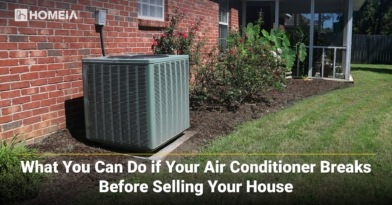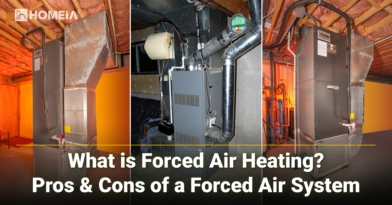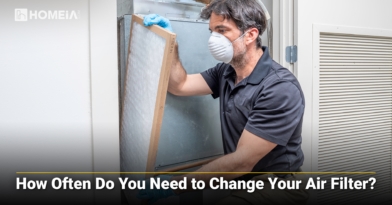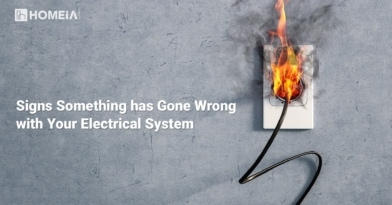24 Frequently Asked Questions About Home Air Conditioner Care
- Author:by The HOMEiA Team
- Category: Home Maintenance

Air conditioning is essential for maintaining comfort in our homes, particularly during the sweltering summer months. These indispensable appliances keep our homes and workplaces comfortable but can also present a host of questions: How do they function? Which type is superior? How can we optimize their energy consumption? What should we do when issues arise?
In this article, we aim to address your most pressing concerns and provide a comprehensive guide on optimally using and maintaining your air conditioner. We’ll explore various topics, from distinguishing among different types of air conditioners and determining the appropriate AC unit size for your home to optimizing temperature settings for energy efficiency and recognizing when your AC unit needs servicing. Let’s dive in!
Here are the 24 Frequently Asked Questions about home air conditioner care:
Table of Contents:
- 1. What are the different types of air conditioners, and how do they work?
- 2. Which AC is better: Window or split AC?
- 3. How can I tell if my AC unit is the correct size for my home?
- 4. What are the ideal temperature settings for my AC to optimize energy usage?
- 5. What are some energy-efficient features to look for when purchasing a new air conditioner?
- 6. What is the role of refrigerants in an AC, and how often should they be refilled?
- 7. What should I do before turning on my air conditioner?
- 8. How often should I clean or replace my air conditioner filters?
- 9. What are the signs that my AC unit needs servicing?
- 10. What caused my AC to stop working?
- 11. Why is my outside AC unit not working?
- 12. Why is my air conditioner not blowing cold air?
- 13. Why is my air conditioner making noises?
- 14. Why is my air conditioner leaking water?
- 15. What are some common error codes in air conditioners, and what do they mean?
- 16. What are some common troubleshooting steps if my air conditioner isn’t cooling effectively?
- 17. How much does it cost for a technician to repair my AC unit?
- 18. How much does it cost to replace my AC unit?
- 19. Can I install an air conditioner myself, or should I hire a professional?
- 20. Where should I go if I need an air conditioner installed or repaired?
- 21. What are the potential health impacts of a poorly maintained air conditioner?
- 22. How can regular maintenance extend the lifespan of my AC unit?
- 23. How long should a typical air conditioner last?
- 24. How can I care for my AC to make it last longer?
1. What are the different types of air conditioners, and how do they work?
Air conditioners come in many shapes and sizes, each suited to specific needs.
- a. Central air conditioners, the most common type in the U.S., consist of an outdoor unit and an indoor unit. They circulate cool air through ductwork.
- b. Split air conditioners, or ductless units, consist of an outdoor compressor connected to one or more indoor air handling units, ideal for cooling individual rooms.
- c. Portable air conditioners stand alone and can be moved from room to room, exhausting hot air through a window vent.
- d. Window units fit into a window space and expel hot air outside while pushing cool air inside.
What You Can Do if Your Air Conditioner Breaks Before Selling Your House
Homebuyers expect to step into a perfectly temperature-controlled environment and be able to trust that the existing HVAC will continue to work for a while. So, if your A/C is not functioning when selling your house; here’re a few solutions that could help you sell your home quickly…
2. Which AC is better: Window or split AC?
Choosing between a window and a split air conditioner depends on your needs. Window units generally have a lower upfront cost and are easier to install. On the other hand, split air conditioners are quieter, more aesthetically pleasing, provide better air distribution, and are ideal for homes without ductwork or for cooling individual rooms.
3. How can I tell if my AC unit is the correct size for my home?
The size of your AC unit should correspond to the total square footage of the area you need to cool. Professionals typically measure this in “tons” or BTUs (British Thermal Units). For instance, a 1,500-square-foot home might require a 2.5-ton air conditioner.
An overly large AC won’t adequately dehumidify your home, and an undersized unit won’t be able to cool it effectively. Always consult an HVAC professional for an accurate assessment.
4. What are the ideal temperature settings for my AC to optimize energy usage?
Optimizing energy usage requires a balance between comfort and efficiency. Energy Star, a program of the EPA and the U.S. Department of Energy, recommends setting your air conditioner at 78 degrees Fahrenheit (25.5 Celsius) when you’re at home and awake and higher when you’re away or asleep. Remember, the closer your indoor and outdoor temperatures are, the lower your overall cooling bill will be.
5. What are some energy-efficient features to look for when purchasing a new air conditioner?
Consider the Seasonal Energy Efficiency Ratio (SEER) when buying a new air conditioner. The higher the SEER rating, the more efficient the unit. Look for a programmable thermostat that lets you control the temperature according to your schedule. Other features include a variable speed blower to adjust airspeed, a fan-only switch for less cooling and an energy-saving setting that maximizes efficiency.
What is Forced Air Heating? Pros & Cons of a Forced Air System
Forced air heating systems are the most popular home heating systems in North America. But how do they work? And are they right for all homeowners, or are there other options? Here we’ll explore how a forced air system works and take a look at its Pros and Cons. Then we’ll introduce a few alternatives that may work for certain homeowners…
6. What is the role of refrigerants in an AC, and how often should they be refilled?
Refrigerants play a crucial role in the cooling process. They absorb heat from indoor air and release it outside, thereby cooling your home. In a well-maintained air conditioner, refrigerants last for the AC’s lifetime. However, if your AC is underperforming or if you notice a refrigerant leak, you should immediately call an air conditioning repair technician. Never attempt to refill refrigerants yourself due to their potentially hazardous nature.
7. What should I do before turning on my air conditioner?
Before turning on your air conditioner, clean or replace the filters to ensure adequate airflow. Also, clear any debris from the exterior unit and check for visible damage. Inside, make sure your vents are clean and unblocked. If it’s the season’s first run, consider having a professional perform a system check to verify everything is in working order.
8. How often should I clean or replace my air conditioner filters?
Air conditioner filters trap dust and other particles to maintain air quality. Cleaning or replacing your filters every one to three months is crucial to your system’s efficiency and your home’s air quality. If you have pets or someone in your house has allergies, more frequent changes might be necessary.
9. What are the signs that my AC unit needs servicing?
Watch out for signs such as unusual noises, sudden energy bill increases, inadequate cooling or a system that frequently turns on and off. Call a professional immediately if you notice water leaks or if the system blows warm air.
9 Affordable Ways to Heat Your Home This Winter
If your heating bill was frightening last year, if you’re building a residence or vacation home, or if your old system is starting to fail, it is time to look at your options when it comes to heating your home. Here we’ll explore some cost-effective ways to keep your space comfortable this winter…
10. What caused my AC to stop working?
Numerous issues could cause your AC to stop working. Common problems include circuit breaker or fuse issues, a worn-out fan motor, a frozen evaporator coil or thermostat issues. Remember, a professional should handle significant problems to avoid damaging the system further.
11. Why is my outside AC unit not working?
If your outside AC unit is not working, it may be due to a lack of power, a faulty thermostat, a broken motor, a low refrigerant level or a dirty condenser. Check the circuit breaker and the thermostat settings before calling a professional.
12. Why is my air conditioner not blowing cold air?
Several things can cause this issue, including a dirty air filter, a blocked condenser, a low refrigerant level or a non-working fan. Incorrect thermostat settings or a lack of power to the system could also be responsible.
13. Why is my air conditioner making noises?
Air conditioners can make noises for several reasons. While some sounds are normal, others, like grinding, squealing or gurgling, may signal issues with the fan motor, refrigerant leaks or a lack of lubrication in the system. These noises often indicate a need for immediate professional attention.
How Often Do You Need to Change Your Air Filter?
When was the last time you changed your home’s air filter? If you can’t remember, it’s probably time to do it again. It’s generally an easy maintenance task that doesn’t require any special skills. But first, let’s look at what your air filter does and why you need to change it…
14. Why is my air conditioner leaking water?
A leaking air conditioner could be due to a blocked or broken condensation drain, a dirty air filter or a low refrigerant level, which causes the evaporator coil to freeze and then defrost, leading to an overflow. Make sure to have a professional diagnose and fix the issue to avoid potential water damage.
15. What are some common error codes in air conditioners, and what do they mean?
Error codes vary by brand and model but help diagnose specific issues. For example, an E1 error often means a problem with the circuit board. An F2 error could indicate a fan malfunction, while an E4 error might signal low refrigerant. Always refer to your user manual or contact a professional when an error code appears.
16. What are some common troubleshooting steps if my air conditioner isn’t cooling effectively?
First, check your thermostat settings and ensure your filters are clean. Verify that the outdoor unit isn’t blocked and that the circuit breakers are on. If you still face issues, you might have a refrigerant leak or a mechanical problem requiring professional attention.
17. How much does it cost for a technician to repair my AC unit?
The cost of repairing an air conditioner varies greatly depending on the problem. Minor issues, such as a fuse replacement, might cost around $50 to $200, while more complex repairs, like a refrigerant leak or a compressor replacement, can run from $200 to $2,000. Remember, regular maintenance can often prevent costly repairs.
Signs Something Has Gone Wrong with Your Electrical System
Fortunately, it’s not hard to make sure your electrical system stays in tip-top shape. Just pay attention once in a while and notice if there are any signs of trouble. Here’re 9 big signs that your electrical system has a problem—and what to do to keep the problem from growing even…
18. How much does it cost to replace my AC unit?
The cost of replacing an AC unit depends on the unit’s type and size, the installation’s complexity, and where you live. A typical range could be anywhere from $2,500 to $7,500 for a new central air conditioner. Ductless mini-split systems cost less on average, but can range from $2,000 to $14,500. Always get multiple quotes and check the reputation of the installer.
19. Can I install an air conditioner myself, or should I hire a professional?
While you can install a window or portable air conditioner yourself, you should hire a professional for split systems, central AC units or any system involving refrigerants. Improper installation can result in inefficient operation, increased energy costs and potential safety hazards.
20. Where should I go if I need an air conditioner installed or repaired?
Contacting a licensed HVAC professional for installation or repair services is best. Many hardware stores also offer these services. Always check the provider’s credentials, and remember to read reviews from previous customers to ensure you’re getting a reliable service.
21. What are the potential health impacts of a poorly maintained air conditioner?
A poorly maintained air conditioner can harbor mold and bacteria, leading to poor indoor air quality. This can trigger allergies, asthma and other respiratory issues. A malfunctioning unit can also cause headaches, fatigue and dry skin due to improper humidity control.
How to Raise Your Home’s Value with Bathroom Renovations
Bathroom renovations are an excellent way to add value to your home. As with any remodeling project, however, you can’t expect to recoup the entire cost of the project when you sell. Remodel Magazine puts the expected value of a midrange bathroom redo at 64 percent of the price tag. If you should happen to sell the house in the future, you’ll…
22. How can regular maintenance extend the lifespan of my AC unit?
Regular maintenance ensures that your AC unit runs efficiently, prevents premature breakdowns and extends its lifespan. Maintenance includes cleaning or replacing filters, checking for refrigerant leaks, inspecting the fan motor and belts, cleaning the coils and checking the system’s overall operation.
23. How long should a typical air conditioner last?
With regular maintenance, a typical air conditioner can last between 15 and 20 years. Factors affecting its lifespan include the quality of the installation, the unit’s model and quality, how often you use it and the climate in your region.
24. How can I care for my AC to make it last longer?
To extend your AC’s life, schedule regular professional maintenance, clean or replace filters regularly, ensure the outdoor unit is debris-free and use a programmable thermostat to minimize unnecessary operation. When the AC is not in use, like in cooler months, cover the outdoor unit to protect it from harsh weather.
Navigating the world of home air conditioning does not have to be daunting. With a clear understanding of the various types of air conditioners, their operation and their maintenance requirements, you can ensure that your home remains a cool sanctuary during the warmest months. When in doubt, consult a professional HVAC technician to ensure your system works optimally and safely.
How to Install Insulation in Your Home
You’re curled up inside your charming historic home on a winter night when suddenly the air turns cold. It’s a ghost! Actually, it’s just a draft. Heat from inside is leaking to the outside, and the air around you is dropping in temperature. Old houses, and plenty of new ones, tend to be leaky. But there’s something you can do about it: add insulation.


























